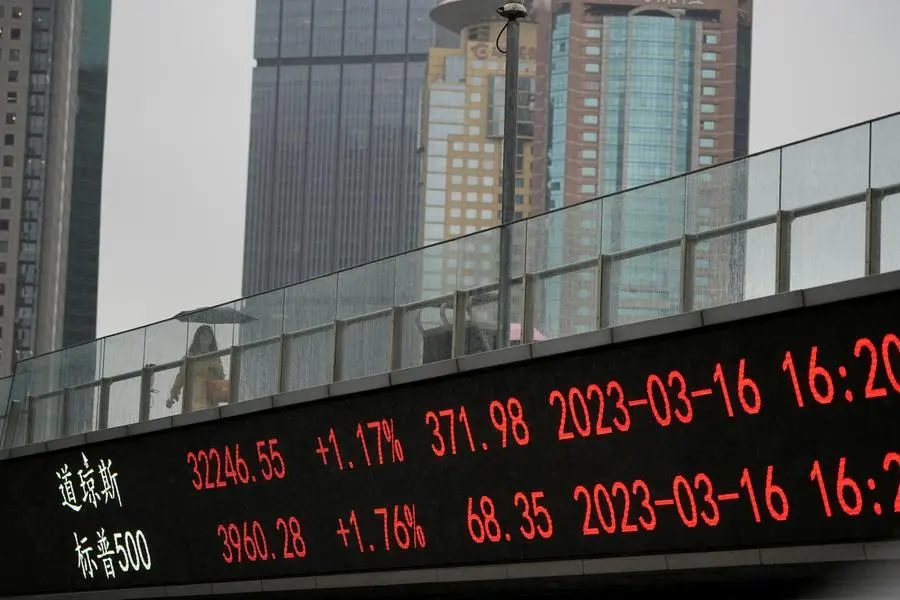PHOTO
SINGAPORE - Asian stocks fell and the dollar climbed to more than five-month highs on Tuesday as stronger-than-expected U.S. retail sales for March further reinforced expectations that the Federal Reserve is unlikely to be in a rush to cut interest rates this year.
Rising geopolitical tensions kept risk sentiment in check, lifting prices of gold and oil, while investor focus in Asia turns to China with GDP data due at 0200 GMT.
MSCI's broadest index of Asia-Pacific shares outside Japan fell 1.4% to nearly seven-week lows of 521.92, with Japan's Nikkei down 1.6%.
U.S. stocks closed sharply lower on Monday as a jump in Treasury yields weighed on sentiment amid concerns about rising tensions between Iran and Israel.
Israelis awaited word on how Prime Minister Benjamin Netanyahu would respond to Iran's first-ever direct attack on their country. Netanyahu on Monday summoned his war cabinet for the second time in less than 24 hours to weigh a response to Iran's weekend missile and drone attack, a government source said.
"The markets have come alive with the sound of derisking, deleveraging, hedging and broad managing of risk exposures," said Chris Weston, head of research at Pepperstone.
"There is certainly not much in the news flow to inspire risk-taking and there is a growing list of factors to refrain from buying and to manage exposures."
U.S. retail sales rose 0.7% last month, the Commerce Department's Census Bureau said on Monday, while economists polled by Reuters had forecast retail sales, which are mostly goods and are not adjusted for inflation, would rise 0.3%.
The stronger-than-expected data comes after a report last week underscored inflation remains stickier than markets had expected, leading to a drastic scaling back of rate cuts this year.
Traders now anticipate 45 basis points of cuts this year, down from more than 160 bps in expected easing at the start of the year. Markets are now pricing in September, instead of June, to be the starting point for rate cuts, according to CME FedWatch Tool.
The yield on 10-year Treasury notes was at 4.608% in Asian hours having surged to a five-month high of 4.663% on Monday.
The elevated yields boosted the dollar and kept the yen near 34-year lows it has been rooted at in the past few days.
The dollar index, which measures the U.S. currency versus six rivals, was up 0.028% at 106.23, having risen 0.189% overnight. The yen weakened to 154.39 leading to fresh worries over intervention and comments from officials.
Japanese Finance Minister Shunichi Suzuki said on Tuesday he was closely watching currency moves and will provide a "thorough response as needed" after the dollar surged to a fresh 34-year high.
Carol Kong, a currency strategist at Commonwealth Bank of Australia, said elevated oil prices and expectations of higher for longer U.S. interest rates are underpinning dollar/yen.
"The dollar/yen remains at risk of pulling back sharply should the Ministry of Finance decide to step into the FX markets and buy JPY. The weaker the JPY stays, the higher the risk that the Bank of Japan will deliver an earlier rate hike in our view."
All eyes during Asian trading hours will be on China GDP along with industrial activity, fixed asset investment, retail sales and property market data.
"The property market has yet to confirm a bottom, and markets will watch the price data closely for any signs of stabilisation; a bottoming out of housing prices would be a positive sign of sentiment recovery," ING economists said.
In commodities, U.S. crude rose 0.63% to $85.95 per barrel and Brent was at $90.63, up 0.59% on the day on rising tensions in the Middle East.
Spot gold added 0.1% to $2,385.88 an ounce.
(Editing by Jacqueline Wong)




















